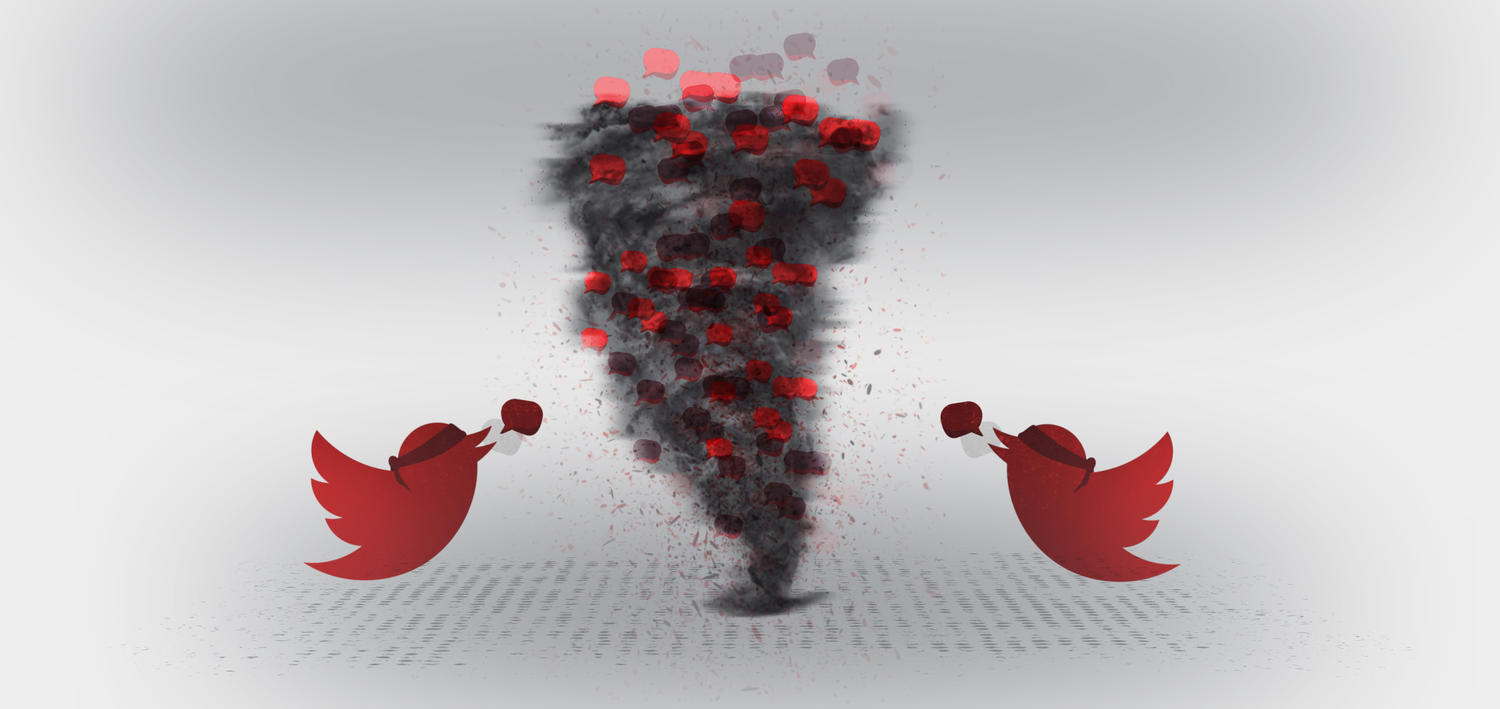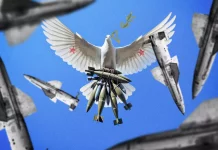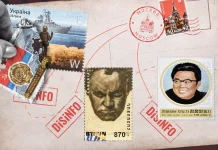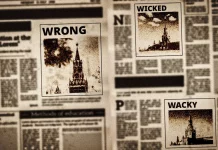
In America, debate over the reach of Moscow propaganda heats up and scrambles political alliances
By Steven Yoder, for Codastory
Russia is a character in most U.S. political debates today, and the violence in Charlottesville the weekend of August 11 was no different. By Monday John Schindler, a columnist for the conservative outlet The Observer, was attributing the racist rally in part to Russian meddling. Schindler pointed to march organizer Richard Spencer’s various ideological ties to Moscow and warned of ominous possibilities: “There are no publicly known cases of American right-wing radicals receiving terrorist training from Russian intelligence, but this may only be a matter of time.”
“Preposterous — the author is a known conspiracy theorist,” replies Sean Guillory, founder of the Russia Blog Podcast and a Russia expert who teaches courses at the University of Pittsburgh’s Center for Russia and East European Studies. (Guillory points to a Vox article in May charging that Schindler is among a group of commentators who constitute a “fake news bubble” on Russia.) Guillory views thinking like Schindler’s as an enormous exaggeration of Russia’s soft power. “Maybe in Eastern Europe, but not here,” he says. “They have RT and Sputnik. We have Ironman.”
That’s part of an intensifying U.S. debate over the importance of Russian disinformation in domestic politics. What’s at stake is the direction of the U.S.-Russia relationship — and time will tell whether it’s salvageable or beyond repair, say Russia experts.
At the most visible level, it’s an intramural argument among media personalities and politicians within the same political families. On the left, liberal Peter Beinart argues that progressives like Max Blumenthal and Glenn Greenwald are letting their opposition to U.S. militarism blind them to the reality of Russian interference. On the right, Fox News analyst Ralph Peters and Fox News host Tucker Carlson got into a bitter on-air exchange when Peters compared Vladimir Putin to Hitler and accused Carlson of “cheering for” Putin.
To complete the circle, Greenwald bolstered his case by inviting Carlson onto his podcast and Carlson did the same by inviting Blumenthal.
But since the election, bona fide Russia experts also have been battling over the extent of Russian influence. “We know that for years Russia has engaged in what they themselves call an ‘information war’ against perceived enemies of the Putin regime… designed to sow division, cause problems, and undermine the legitimacy of more liberal figures in those parties and systems,” says Theodore Gerber, who directs the Center for Russia, East Europe, and Central Asia at the University of Wisconsin-Madison. He says an “overwhelming majority” of Russia experts and scholars agree with that view. “There are a few renegade so-called experts who dispute that… but I think they’re a very small minority in the profession,” he says. Another Russia scholar agrees. “I don’t think it’s much of a debate,” says Alice Nakhimovsky, professor of Russian and Eurasian Studies at Colgate University.
On the other side is Ellen Mickiewicz, a public policy professor at Duke who has studied Russian media and says the disinformation threat is exaggerated. For example, a report by the U.S. director of national intelligence in January on Russian meddling in the U.S. election gave a prominent role to Russia-sponsored network RT as a platform for Russian messaging. But in a post on an academic site, Mickiewicz notes that RT has “miniscule audience numbers.” (Indeed, RT didn’t make a 2015 list of the most-popular 94 cable TV channels.)
The last U.S. election heightened the stakes among experts in the disagreements over Russia’s role. Eugene Huskey, William R. Kenan chair at Stetson University, says that inside academic circles most of the Russia specialists and scholars take the position that Russia’s influence on domestic affairs is pernicious. “This is a guess, but I think most of my colleagues…are quite angry about what sort of intervention Russia has exercised in our domestic affairs,” he says.
But he too says there are exceptions, the most prominent being Stephen Cohen, a leading scholar of Russia and the Soviet Union. Cohen argues that the hunt for Kremlin ties is part of an effort to launch a new Cold War.
The disagreements have gotten unusually personal at least once. A meeting of the Association for Slavic, East European, & Eurasian Studies last November featured a discussion among Cohen, Stanford Russia scholar Kathryn Stoner, and two other Russia experts. By the end, Cohen and Stoner were exchanging “death stares” and Cohen had charged that there was no real U.S. debate over Russia policy and that all of his enemies were “McCarthyists” who were keeping him from speaking out. That’s according to one who was there, Russia scholar Yuval Weber, Daniel Morgan Graduate School—Kennan Institute Fellow.
That Cohen is a lightning rod in the Russia controversy isn’t new. He draws media attention because he’s in New York City and because his wife, Katrina vanden Heuvel, is editor and publisher of The Nation magazine, for which Cohen writes often. But Huskey says that doesn’t necessarily reflect his following among Russia scholars. “He has enormous authority in the field…he has a platform,” says Huskey. “But I wouldn’t say he’s the leader of a movement — I haven’t seen people supporting him.” Nakhimovsky agrees: “I would say he’s way, way off of the mainstream,” she says. “He’s had a distinguished career—when someone with that kind of serious credibility comes out the way he has, it’s unsettling for people in my field.”
And his role in Russia issues nationally goes back to at least the seventies, when he led other liberal Russia scholars to break from the dominant narrative and propound a view of the Soviet Union less as totalitarian than simply inefficient and corrupt, says Huskey.
Today the institutional muscle is on the side of those who think Russia’s influence is widespread. Huskey says that the section of the political spectrum from moderate Democrats to moderate Republicans have come down on the side of stopping alleged Russian interference. That explains why in July, high-level former staffers to Hillary Clinton, Barack Obama, and George W. Bush united to launch the Alliance for Securing Democracy. Run out of the German Marshall Fund of the United States, it includes an online dashboard that monitors the messaging of 600 “linked” Twitter accounts that it says reflect “Russian messaging priorities.”
But the debate over Russian influence probably isn’t clearly winnable because it’s so hard to measure. Even the German Marshall Fund’s J.M. Berger — who works on the Alliance for Securing Democracy project — seemed to acknowledge how blurry are the lines in a series of August 8 tweets: “…it’s a mistake to think everything you see trending in a Russian influence network was workshopped in St. Petersburg. Often they’re just boosting somebody else’s signal,” he wrote. And apart from the facts of the case, Weber says the debate follows a historic pattern — during periods of intense polarization, Russia is “the canvass on which we fight our battles.” For example, during the 1980s a partisan battle was waged over U.S. foreign policy and the validity of the peace movement, says Weber. Today it’s Trump. In both cases, Russia is the the backdrop.
But this time around there are reasons the divide over Russia’s role has shredded the traditional political map, splintering the right and left. On the right, some are attracted by Putin’s presentation of the country as a guarantor of Western cultural and religious values on issues like combating Islam and gay rights, says Huskey. Some conservatives see those having been eroded over the years by the Obama administration and mainstream Republicans. Guillory says that conservative view of Russia as protector of Christian nations goes back further — to the late 1800s, when Russia was still engaged in a series of wars with Muslim Turkey.
On the left, those who have diverged — people like Cohen and Greenwald — are motivated by a longstanding critique of U.S. foreign policy, says Weber. For them, “what Russia has done — both in its Soviet guise and its contemporary format — is offer a state that’s willing to stand up to the United States,” he says. Their critique also is motivated by their suspicion of the role of U.S. intelligence agencies — the “deep state” — in allegedly manipulating foreign policy, says Huskey.
What’s at risk in the ongoing argument? A lot, says Huskey. The focus on Russian meddling crowds off the front page a lot of important issues on which the U.S. needs to work with Russia, like policies on the Middle East, nuclear weapons and the Korean peninsula.
And Weber says the debate likely has tilted the politics of the Russia relationship permanently. Because Trump is seen as favoring Moscow, Russia is now a domestic issue. “Think of all the debates we’re having on race relations, health care, all of it — there’s nothing that isn’t tied to Donald Trump.” As Trump falls into increasing disfavor among politicians of both parties, so does Russia: “I think the next President, whether he or she is Democrat or Republican, is going to be genuinely Russo-phobic and genuinely hawkish on Russia,” says Weber.
By Steven Yoder, for Codastory
Artwork by Alessandra Cugno.






